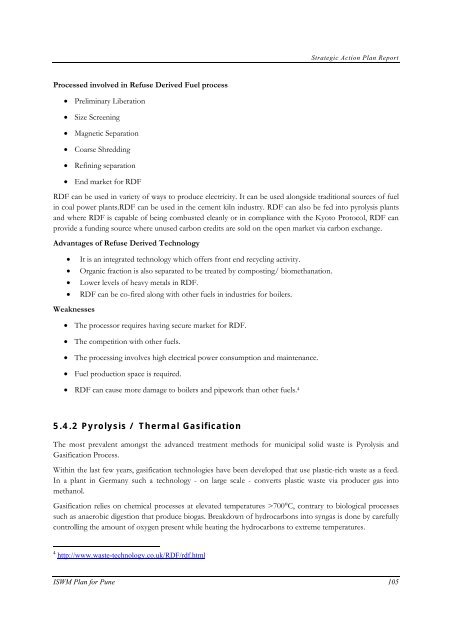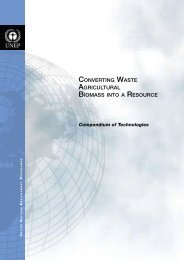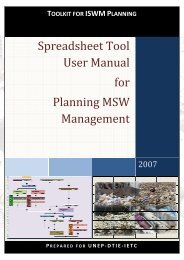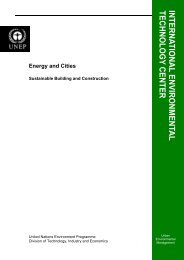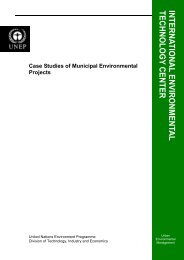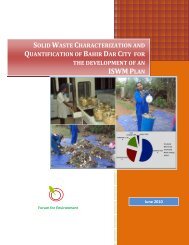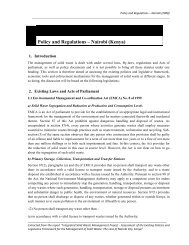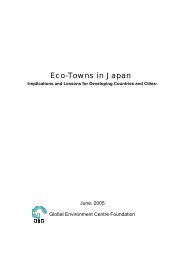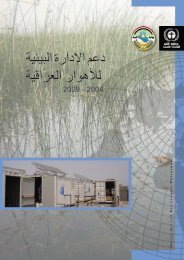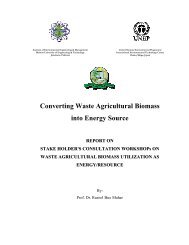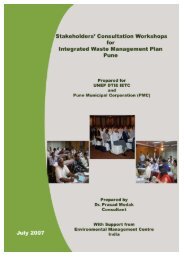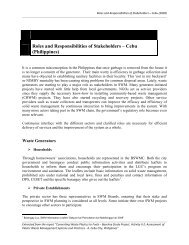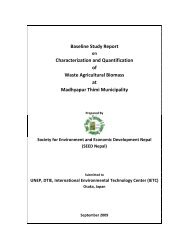- Page 2 and 3:
Strategic Action Plan for Integrate
- Page 4 and 5:
Strategic Action Plan Report Acknow
- Page 6 and 7:
Strategic Action Plan Report Figure
- Page 8 and 9:
Strategic Action Plan Report The Co
- Page 10 and 11:
Strategic Action Plan Report S1: Es
- Page 12 and 13:
streams is varying. The institution
- Page 14 and 15:
Strategic Action Plan Report Table
- Page 16 and 17:
Strategic Action Plan Report 3.5.2.
- Page 18 and 19:
Strategic Action Plan Report 7.1.1
- Page 20 and 21:
Strategic Action Plan Report 4.2 Vi
- Page 22 and 23:
Strategic Action Plan Report List o
- Page 24 and 25:
Strategic Action Plan Report MIDC M
- Page 26 and 27:
Strategic Action Plan Report projec
- Page 28 and 29:
Strategic Action Plan Report Figure
- Page 30 and 31:
Strategic Action Plan Report • Mo
- Page 32 and 33:
Strategic Action Plan Report This i
- Page 34 and 35:
Strategic Action Plan Report the Si
- Page 36 and 37:
Strategic Action Plan Report Chapte
- Page 38 and 39:
Strategic Action Plan Report Figure
- Page 40 and 41:
Strategic Action Plan Report 4. Pre
- Page 42 and 43:
Strategic Action Plan Report batter
- Page 44 and 45:
Strategic Action Plan Report electr
- Page 46 and 47:
Strategic Action Plan Report Chapte
- Page 48 and 49:
Strategic Action Plan Report Land-u
- Page 50 and 51:
Strategic Action Plan Report Figure
- Page 52 and 53:
Strategic Action Plan Report Figure
- Page 54 and 55:
Strategic Action Plan Report 3.4.2
- Page 56 and 57:
Strategic Action Plan Report a prel
- Page 58 and 59:
Strategic Action Plan Report Figure
- Page 60 and 61:
Strategic Action Plan Report The de
- Page 62 and 63:
Strategic Action Plan Report Figure
- Page 64 and 65:
Strategic Action Plan Report Figure
- Page 66 and 67:
Strategic Action Plan Report The wa
- Page 68 and 69:
Strategic Action Plan Report Table
- Page 70 and 71:
Strategic Action Plan Report MSW Co
- Page 72 and 73:
Strategic Action Plan Report Figure
- Page 74 and 75:
Strategic Action Plan Report Figure
- Page 76 and 77:
Strategic Action Plan Report 3.5.1.
- Page 78 and 79: Although the numbers of vermi-compo
- Page 80 and 81: Figure 3.24: Location of the Existi
- Page 82 and 83: Figure 3.26: Typical Flow Diagram o
- Page 84 and 85: 3.5.3 Existing Management of C&D Wa
- Page 86 and 87: As can be observed from Figure 3.27
- Page 88 and 89: The implementation of the SWM funct
- Page 90 and 91: compliance, institutional capacitie
- Page 92 and 93: In the context of Bio-medical Waste
- Page 94 and 95: • The waste collection across the
- Page 96 and 97: probable gaps in waste related infr
- Page 98 and 99: egarding the implementation of all
- Page 100 and 101: 3.7.4 Financial Constraints In gene
- Page 102 and 103: Strategic Action Plan Report 4.1 Ov
- Page 104 and 105: Strategic Action Plan Report Box 4.
- Page 106 and 107: Strategic Action Plan Report Vision
- Page 108 and 109: Strategic Action Plan Report • Ac
- Page 110 and 111: Strategic Action Plan Report This r
- Page 112 and 113: Strategic Action Plan Report 3. Phy
- Page 114 and 115: Strategic Action Plan Report In Pun
- Page 116 and 117: Strategic Action Plan Report As the
- Page 118 and 119: Strategic Action Plan Report S. N.
- Page 120 and 121: Strategic Action Plan Report • Ra
- Page 122 and 123: Strategic Action Plan Report 3) Ane
- Page 124 and 125: Strategic Action Plan Report The se
- Page 126 and 127: Strategic Action Plan Report Wards
- Page 130 and 131: Strategic Action Plan Report Pyroly
- Page 132 and 133: Strategic Action Plan Report indust
- Page 134 and 135: Strategic Action Plan Report 3. Tre
- Page 136 and 137: 6. The Strategic Action Plan Strate
- Page 138 and 139: Strategic Action Plan Report Table
- Page 140 and 141: Strategic Action Plan Report Theme
- Page 142 and 143: Strategic Action Plan Report Theme
- Page 144 and 145: Strategic Action Plan Report Theme
- Page 146 and 147: Strategic Action Plan Report Theme
- Page 148 and 149: Strategic Action Plan Report The Sc
- Page 150 and 151: Strategic Action Plan Report Table
- Page 152 and 153: INVENTORIZATION OF SOLID WASTE Targ
- Page 154 and 155: DEVELOPMENT OF A MODEL FOR MUNICIPA
- Page 156 and 157: SECURING CARBON CREDITS THROUGH CLE
- Page 158 and 159: ASSESSMENT OF EXISTING WASTE DISPOS
- Page 160 and 161: IDENTIFICATION AND PRELIMINARY DESG
- Page 162 and 163: OPTIMISATION AND STRENGTHENING OF M
- Page 164 and 165: ESTABLISHMENT OF COMMUNITY SORTING
- Page 166 and 167: PILOT PROJECTS FOR RECYCLE AND REUS
- Page 168 and 169: RECYCLING OF PLASTIC WASTE 3 R INIT
- Page 170 and 171: ESTABLISH ELECTRONIC WASTE (E-WASTE
- Page 172 and 173: ESTABLISH A COMPACT FLUORESCENT LIG
- Page 174 and 175: ESTABLISHMENT OF ENVIRONMENTAL AWAR
- Page 176 and 177: PRIVATE PARTNERSHIP IN CURRENT WAST
- Page 178 and 179:
PRIVATE PARTNERSHIPS IN DECENTRALIZ
- Page 180 and 181:
ESTABLISHMENT OF COMPOST COLLECTION
- Page 182 and 183:
DEMONSTRATION PROJECTS FOR HOTEL WA
- Page 184 and 185:
CONSTRUCTION AND DEMOLITION (C&D) W
- Page 186 and 187:
DESIGN AND LAUNCH OF A COMPREHENSIV
- Page 188 and 189:
TAMING CONSUMPTION OF NON- BIODEGRA
- Page 190 and 191:
IMPARTING AWARENESS AND TRAINING FO
- Page 192 and 193:
INITIATING SCHOOLS’ INVOLVEMENT I
- Page 194 and 195:
INTRODUCING AWARD SCHEMES Target:
- Page 196 and 197:
IMPROVISING WASTE MANAGEMENT DURING
- Page 198 and 199:
ESTABLISHMENT OF STANDARDIZED GUILD
- Page 200 and 201:
ESTABLISHMENT OF A CADRE OF CERTIFI
- Page 202 and 203:
Target: INTRODUCING INDUSTRY-UNIVER
- Page 204 and 205:
ESTABLISHMENT OF A WASTE EXCHANGE C
- Page 206 and 207:
ESTABLISHMENT OF THE INTEGRATED SOL
- Page 208 and 209:
DEVELOP AND INTRODUCE POLICY FOR CO
- Page 210 and 211:
IMPROVING HEALTH AND SAFETY OF PMC
- Page 212 and 213:
STRENGTHENING PMC RAG PICKER CO- OP
- Page 214 and 215:
Strategic Action Plan Report Chapte
- Page 216 and 217:
Strategic Action Plan Report Figure
- Page 218 and 219:
Strategic Action Plan Report Some o
- Page 220 and 221:
Strategic Action Plan Report Figure
- Page 222 and 223:
Strategic Action Plan Report Consul
- Page 224 and 225:
Strategic Action Plan Report A data
- Page 226 and 227:
Strategic Action Plan Report Figure
- Page 228 and 229:
Strategic Action Plan Report and IS
- Page 230 and 231:
as it is aimed at changing a certai
- Page 232 and 233:
During the preparation of ISWM Acti
- Page 234 and 235:
This website could be used by the I
- Page 236 and 237:
• Special training to unqualified
- Page 238 and 239:
As a part of the preparation of ISW
- Page 240 and 241:
Strategic Action Plan Report • Se
- Page 242 and 243:
Strategic Action Plan Report Table
- Page 244 and 245:
Strategic Action Plan Report Activi
- Page 246 and 247:
Strategic Action Plan Report Annexu
- Page 248 and 249:
Strategic Action Plan Report ISWM P
- Page 250 and 251:
Strategic Action Plan Report For Bh
- Page 252 and 253:
Strategic Action Plan Report For Dh
- Page 254 and 255:
Strategic Action Plan Report For Ka
- Page 256 and 257:
Strategic Action Plan Report For Sa
- Page 258 and 259:
Strategic Action Plan Report For Ti
- Page 260 and 261:
Strategic Action Plan Report For Wa
- Page 262 and 263:
Strategic Action Plan Report Annexu
- Page 264 and 265:
Strategic Action Plan Report pumpin
- Page 266 and 267:
Strategic Action Plan Report There
- Page 268 and 269:
Strategic Action Plan Report to cha
- Page 270 and 271:
Strategic Action Plan Report 6. Det
- Page 272 and 273:
Strategic Action Plan Report Annexu
- Page 274 and 275:
Strategic Action Plan Report Instit
- Page 276 and 277:
Strategic Action Plan Report Instit
- Page 278 and 279:
Strategic Action Plan Report Instit
- Page 280 and 281:
Strategic Action Plan Report Instit
- Page 282 and 283:
Strategic Action Plan Report Instit
- Page 284 and 285:
Strategic Action Plan Report Helped
- Page 286 and 287:
Strategic Action Plan Report The pr
- Page 288 and 289:
Strategic Action Plan Report The IS
- Page 290:
Strategic Action Plan Report 1400-1


